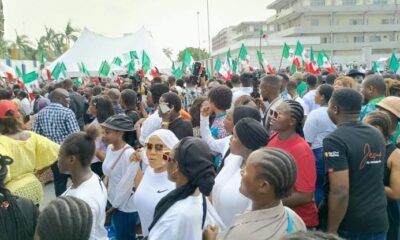News
Hunger protest: ophthalmologists caution against prolonged exposure to tear gas
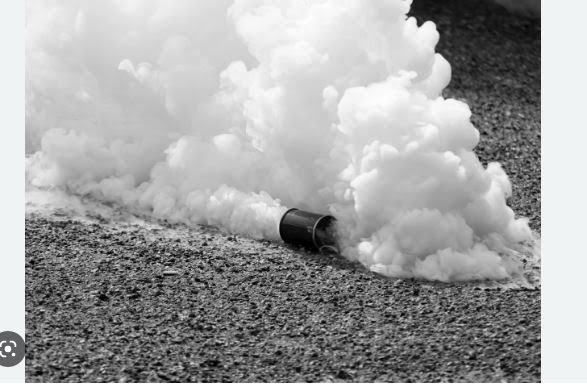
Hunger protest: ophthalmologists caution against prolonged exposure to tear gas
*Says, it may cause blindness
By Francesca Hangeior
Leading eye specialists have cautioned that prolonged exposure to tear gas could cause temporary blindness and other eye complications, which if left untreated could lead to permanent blindness.
They also noted that people without protective clothes and devices were at risk of cornea injuries and conjunctivitis when exposed to tear gas.
The ophthalmologists advised those exposed to tear gas to quickly rinse their eyes and affected body parts with water.
The experts’ warning and advice comes on the heels of the 10-day protest that began on August 1st and had been marred with security agents firing tear gas to disperse protesters.
Under the #Endbadgovernance and #Hungerprotests, several Nigerians in several states of the federation, have through placards and chants demonstrated their displeasure with the current economic hardship.
But the President, Bola Tinubu, in an address to the nation on Sunday, told protesters and the organisers to suspend any further protest and create room for dialogue.
Tear gas is a riot control agent mostly used by law enforcement agents that temporarily constrain people by irritating the eyes, mouth, throat, lungs, and skin.
According to the Centre for Disease Control and Prevention, long-lasting exposure or exposure to a large dose of tear gas may cause blindness, glaucoma and respiratory failure possibly resulting in death.
However, a professor of Ophthalmology at the University of Benin, Edo State, Afekhide Omoti, stated that prolonged exposure to tear gas in an enclosed environment could cause blindness.
He, however, noted that the risk of blindness was reduced if the tear gas was used in an open environment.
The Chairman of the National Eye Health Committee said, “In the normal circumstances where tear gas is used in an open environment, it will not cause blindness.
“However, if there is prolonged exposure in a closed environment, it is possible that tear gas can cause blindness,” he said.
The researcher on Glaucoma and Anterior Segment Disorders further noted that physical exertion, such as running after contact with tear gas, makes the affected persons more susceptible to severe symptoms.
Omoti said, “As far as blindness is concerned, large doses may cause temporary blindness.
However, in very unusual circumstances, and depending on the delivery system, more prolonged damage can occur.
Explosive systems, particularly those used in the military, may cause thermal, chemical, and physical damage due to the blast. If left untreated, it can cause permanent blindness. But this is not the usual type used by the anti-riot police.”
The researcher on Glaucoma and Anterior Segment Disorders further noted that tear gas might worsen the conditions of persons with corneal problems but had no effect on those with cataracts and glaucoma.
He added, “Depending on the specific chemical agent used in the tear gas and the mode of delivery, tear gas can cause a variety of eye defects which include mild features such as blepharospasm, conjunctivitis and superficial keratitis.
“More severe complications which are very unlikely include corneal stromal opacities, corneal neovascularisation, neurotrophic keratopathy, conjunctival necrosis, and pseudopterygium. These are all problems with the cornea and conjunctiva, the surface structures of the eye.
“Ordinarily, those with glaucoma should not be at higher risk of blindness from tear gas use. However, if the explosive variety is used, and as I said earlier, this is not the usual type used in our civilian crowd control, then the physical effects may increase the intraocular pressure and worsen the glaucoma or even theoretically cause blindness in terminal stages. But I must again reiterate that this is not likely.”
The ophthalmologist asserted that if these eye defects were untreated, it could cause possible complications, which could lead to blindness.
“Untreated, possible complications which will cause blindness, especially in explosive cases include corneal neovascularisation, stromal thinning, ulceration, infection and perforation. Others include secondary glaucoma, cataract formation, vitreous haemorrhage and traumatic optic neuropathy which are physical complications of the explosive which are not normally used in civilian crowd control,” Omoti said.
Also, the President of the Ophthalmological Society of Nigeria, Dr Abiola Oyeleye, stated that tear gas affects the eyes and skin of those it comes in contact with, noting that when inhaled, it affects the lining of the mouth, nose, chest, lungs and the respiratory system.
The ophthalmologist emphasised that direct exposure of tear gas to the eyes could damage the eye structures and lead to blindness.
The Medical Director of the Eye Doctors Group of Clinics, said, “So if we are specific now about the eyes, what it does, it irritates the eye, and anything that irritates the eye causes tears, and that’s where the name tear gas is from. So the eye sends a message to the brain that something is irritating me and the brain now sends a message to the tear glands saying something is irritating the eye, send tears to the eye, the tear glands now function and send tears to the eye, so it’s a response to whatever agent has caused it, that’s where the name tear gas comes from. Pp
News
Enugu judge faces NJC probe for alleged misconduct
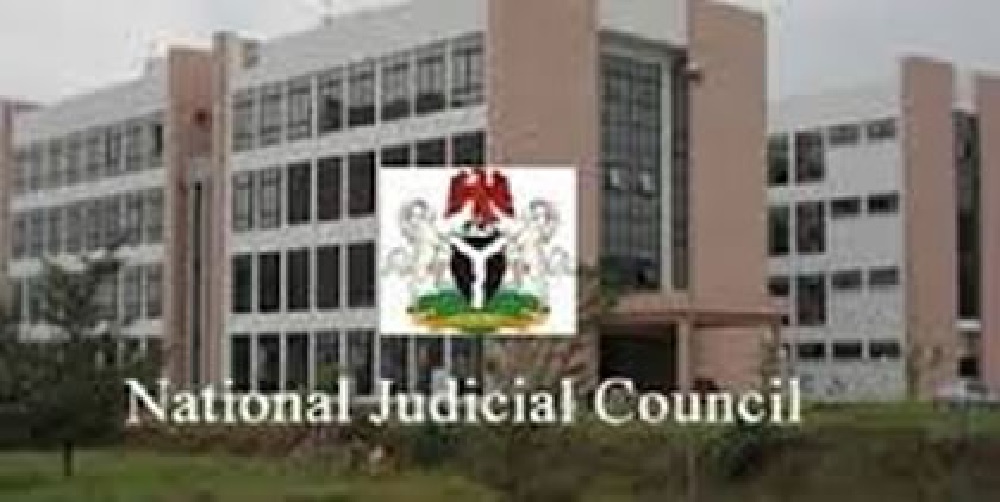
The National Judicial Council, NJC, has acknowledged receipt of a petition against Justice E.N. Oluedo of the Enugu State High Court for alleged misconduct.
In its acknowledgment letter, the NJC confirmed that it is taking action on the petition, which accuses the judge of violating the Code of Conduct for Public Officers, as outlined in the Fifth Schedule to the Nigerian Constitution.
In a letter dated April 17, 2025 (Reference No. NJC/S.14/HC.EN/25/III/112), the Chief Justice of Nigeria and NJC Chairman, Justice Kudirat M.O. Kekere-Ekun, informed the petitioner, Dr. Ifeanyichukwu Okonkwo, that the matter is under review.
Okonkwo had accused Justice Oluedo of misconduct in handling Suit No. E/298C/2019 between the Federal Republic of Nigeria and himself.
Okonkwo, serving as the Liquidator of Ifemelunma and Company Nigeria Enterprises Limited, alleged that Justice Oluedo continued proceedings despite being aware of a pending appeal (Appeal No. CA/E/4C/2025) between the same parties at the Court of Appeal. He argued that this violated judicial protocol and showed bias.
On February 26, 2025, the Economic and Financial Crimes Commission (EFCC) arraigned Okonkwo before Justice Oluedo on a one-count charge of fraud. Okonkwo pleaded not guilty and was permitted to continue under the bail terms previously granted by another judge.
Following his arraignment, Okonkwo issued a press statement questioning the EFCC’s competence in charging him under Section 6(b) of the EFCC Act, 2004. The charge alleged that he fraudulently converted N41 million received from one Onyishi Maduka Samuel, intended for the family of the late Joel Ifemelunma Okoye.
Citing Section 211(1) of the Constitution and several Supreme Court decisions—including Diamond Bank Plc v. Okpara (2018) and Maduagwu v. FRN (2025)—Okonkwo challenged both the EFCC’s authority and the High Court’s jurisdiction to prosecute him. He claimed that both the EFCC and the court registrar were duly served with notices of the pending appeal and a motion for stay of proceedings.
In his April 10, 2025 petition to the NJC, Okonkwo alleged that Justice Oluedo’s insistence on proceeding with the trial aimed to foist a fait accompli on the Court of Appeal, an act he described as judicial impertinence.
The petition was titled: “Petition against His Lordship Hon. Justice E.N. Oluedo for an Act bordering on Judicial Impertinence.”
A copy of the petition, seen by this reporter, outlined Okonkwo’s assertion that Justice Oluedo continued proceedings despite knowledge of the pending appeal.
On February 26, 2025, Okonkwo urged the court to stay proceedings based on due process and respect for the hierarchy of courts.
However, Justice Oluedo, after considering submissions from both Okonkwo and the prosecuting counsel, I.E. Ajobwele, overruled the objection. She cited the Enugu State Administration of Criminal Justice Law (ACJL) 2017, stating that an interlocutory appeal does not automatically stay criminal proceedings.
Okonkwo countered that jurisdiction in criminal matters comes from Section 272(1) of the Constitution, not from procedural laws like the ACJL 2017.
He accused the judge of violating the principle that parties must be given full opportunity to present their case, referencing Western Steel Works Ltd. v. Iron and Steel Workers Union (1986).
He further argued that Nigerian law, citing State v. Ajayi (1996), allows interlocutory appeals and stay of proceedings in criminal trials. He emphasized that fairness and impartiality, observable by the public, were lacking in the judge’s handling of his case.
Citing Akinbobola v. Plisson Fisko (1991), Okonkwo maintained that a court has the power to rescind an order made without jurisdiction. He also referenced Olaseni v. Olaseni (2010), warning that disregarding an appellate court’s authority undermines the rule of law.
Finally, quoting Roman jurist Justinian—”Ignorantia judicis est calamitas innocentis”—Okonkwo warned that judicial ignorance risks inflicting irreversible injustice on innocent parties, stressing that a judge must remain current with the law to ensure fair judgment.
News
Sultan declares Tuesday first day of Zulki’ida 1446AH
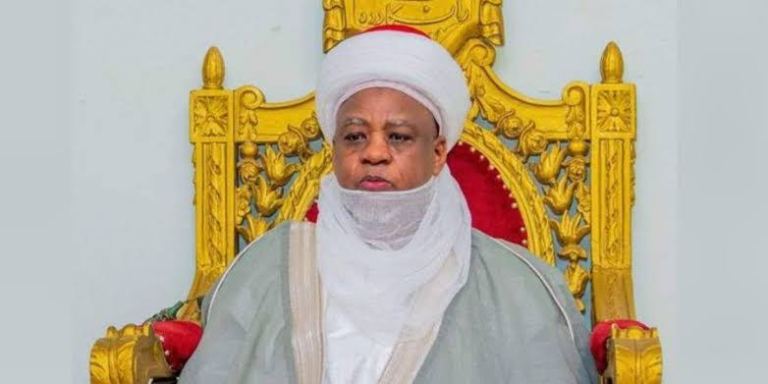
The Sultan of Sokoto and President of the Nigeria Supreme Council for Islamic Affairs, His Eminence Muhammad Sa’ad Abubakar, CFR, has officially declared Tuesday, April 29, 2025, as the first day of Zulki’ida 1446AH.
This declaration was made in a statement issued by Professor Sambo Wali Junaidu, the Wazirin Sokoto and Chairman of the Advisory Committee on Religious Affairs, Sultanate Council, Sokoto.
According to the statement, the announcement followed the absence of any confirmed sighting of the new crescent moon.
The Sultanate Council’s Advisory Committee on Religious Affairs and the National Moon Sighting Committee reported that no credible sightings were received from across the country on Sunday, April 27, 2025.
“In line with Islamic tradition, when the new crescent is not sighted, the current month is completed with 30 days,” the statement explained.
“As a result, Monday, April 28, 2025, will be observed as the 30th day of Shawwal 1446AH.”
“Consequently, Tuesday, April 29, 2025, will officially mark the beginning of the new Islamic month, Zulki’ida 1446AH.”
The Sultan urged Muslim faithful to continue praying for peace, unity, and progress in the country. He also emphasized the importance of upholding Islamic values of compassion, tolerance, and mutual respect.
The Sultanate Council expressed appreciation to members of the National Moon Sighting Committees and collaborating religious organizations for their dedication.
It further encouraged Muslims to always rely on official announcements from the Sultanate Council regarding religious observances.
The Sultan reiterated the Council’s commitment to providing timely and accurate information to guide the Muslim community and prayed that Allah would bless the new month and grant the nation continued peace and prosperity.
News
Police arrest woman for alleged murder of 65-year-old man in Lagos

The Lagos State Police Command has arrested a woman in connection with the death of a 65-year-old man in the Oko-Oba, Abule-Egba area of Lagos, in what authorities are describing as a chilling case of murder.
Confirming the development on Sunday, the Command’s spokesperson, CSP Benjamin Hundeyin, detailed the disturbing circumstances surrounding the incident.
According to Hundeyin, the police were alerted on March 29 to the discovery of a man’s body in a service apartment located in Oko-Oba.
“On March 27, at around 5:20 p.m., an unidentified woman rented the apartment with the deceased,” Hundeyin explained.
“But just hours later, she mysteriously left the scene, taking with her the man’s car and valuables, and telling the housekeeper she would return shortly.”
A routine check the following day led to the discovery of the man’s lifeless body.
At the scene, investigators recovered an empty syringe, two cans of malt drink, and several bottles of water, raising suspicions of foul play.
The body was subsequently transferred to the Lagos State University Teaching Hospital, LASUTH, mortuary for autopsy.
Following an intensive manhunt, police apprehended the suspect on Saturday night around 9:30 p.m. in the Oko-Oba area.
“She confessed to poisoning the deceased by spiking his malt drink with a toxic substance, leading to his tragic death,” Hundeyin revealed.
Further investigations enabled authorities to establish the identity of the victim, who was initially classified as unknown.
The Commissioner of Police, CP Owohunwa Jimoh, has assured Lagos residents of the Command’s unwavering commitment to ensuring public safety and delivering justice.
“Our resolve remains firm, those who commit crimes against the community will be pursued and brought to justice,” Hundeyin emphasized.
-

 News9 hours ago
News9 hours agoJust in: Senator Natasha tenders satirical ‘apology’ to Akpabio
-

 News6 hours ago
News6 hours agoUNUSUAL! Without invitation, Police declared me wanted — Daughter of ABC Transport owner
-
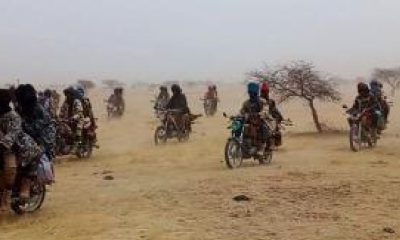
 News4 hours ago
News4 hours agoInsecurity: BUDA urges govt to quickly rescue Baruten from terrorists
-

 News18 hours ago
News18 hours agoBenue LG chairman gives Fulanis 48hrs to leave all farmlands
-

 News2 hours ago
News2 hours agoWeeks to 2nd anniversary, Niger deputy gov, plans to resign, move out personal effects
-
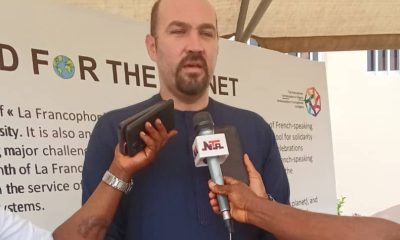
 News24 hours ago
News24 hours agoFrancophone Ambassadors, Nigeria Unite To Fight Against Climate Change
-

 News18 hours ago
News18 hours agoFive suspected kidnappers eliminated by police in Delta
-

 Metro11 hours ago
Metro11 hours ago‘My husband always makes love throughout the night until morning’ – Woman Wants Divorce




